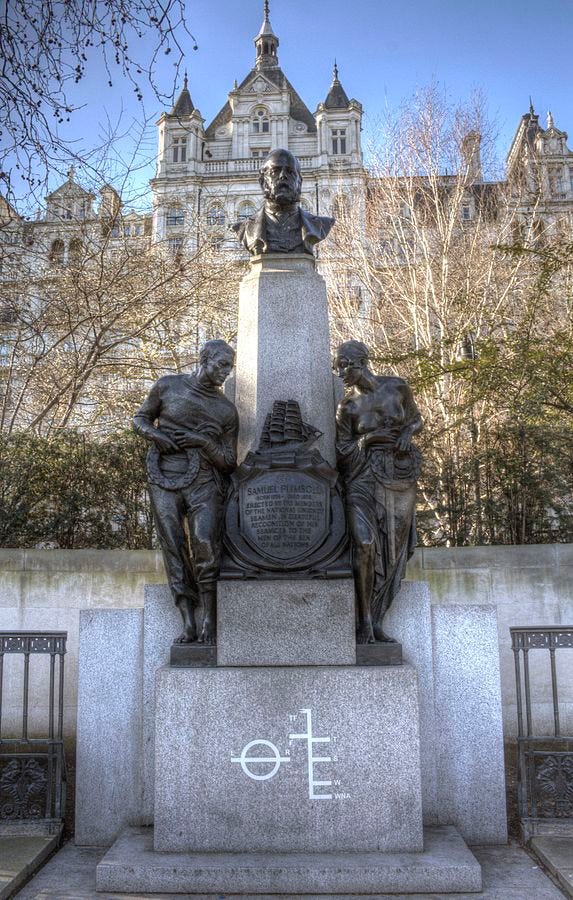Plimsoll Line
'Help the poor seaman for the love of God'
Samuel Plimsoll (1824 – 1898) was a British politician and social reformer, now best remembered for having devised the Plimsoll line (a line on a ship's hull indicating the maximum safe draught, and therefore the minimum freeboard for the vessel in various operating conditions).
Our Seamen: An Appeal
In his book, Our Seamen: An Appeal — Plimsoll detailed the abuses unscrupulous shipowners and shady insurance companies heaped upon the men who went to sea. He provided examples of coffin ships, undermanning, overloading, bad stowage, over insurance, and deficient engines that lead to preventable accidents and heavy loss of life.1
A coffin ship was the name given to a ship that was so poorly maintained that it had only a slim chance of making its destination. In her book about Samuel Plimsoll Nicolette Jones recounts the story of Plimsoll, "The Sailor's Friend," and his wife Eliza, who worked together to defend sailors against nefarious practices including overloading and the use of unseaworthy "coffin ships." 2
Following the publication, a Royal Commission on unseaworthy ships was set up. In 1876, the United Kingdom Merchant Shipping Act made the load line mark compulsory.
Plimsoll Remembered
The backlash of libel cases and vilification almost ruined Plimsoll, but his drive and passion made him feverishly popular with the public; he was the subject of plays, novels, street ballads, and music hall songs. With the demonstrative support of his country, he faced down his enemies, came close to ousting Disraeli's government, and achieved lasting safety measures for merchant sailors, including the load line that bears his name.
A memorial to Plimsoll was erected in 1929 on the Victoria Embankment to remember the man who was instrumental in ensuring that the profits of a ship’s owner were not put before the lives of the crew. The memorial reads:
“Samuel Plimsoll-Born 1824 Died 1898. Erected by the Members of the National Union of Seamen, in Grateful Recognition of His Services to the Men of the Sea in All Nations.”
Plimsoll Samuel. 1873. Our Seaman : An Appeal [Popular ed.] ed. London: Virtue.
Jones Nicolette. 2006. The Plimsoll Sensation : The Great Campaign to Save Lives at Sea. London: Little Brown.




Cool guy! I had to go figure out how to decrypt the markings of course. 🤫
elm
it's a bit of an affliction
The appellation "coffin ships" sends chills up my spine. Growing up in close proximity to the Gloucester Fisherman's Memorial statue brings all those names of "those who went down to the sea in ships" in the 1800s to life in my present day consciousness. Samuel Plimsoll, whose name I'd never heard before now, was a savior of many it seems. Thanks for posting this.